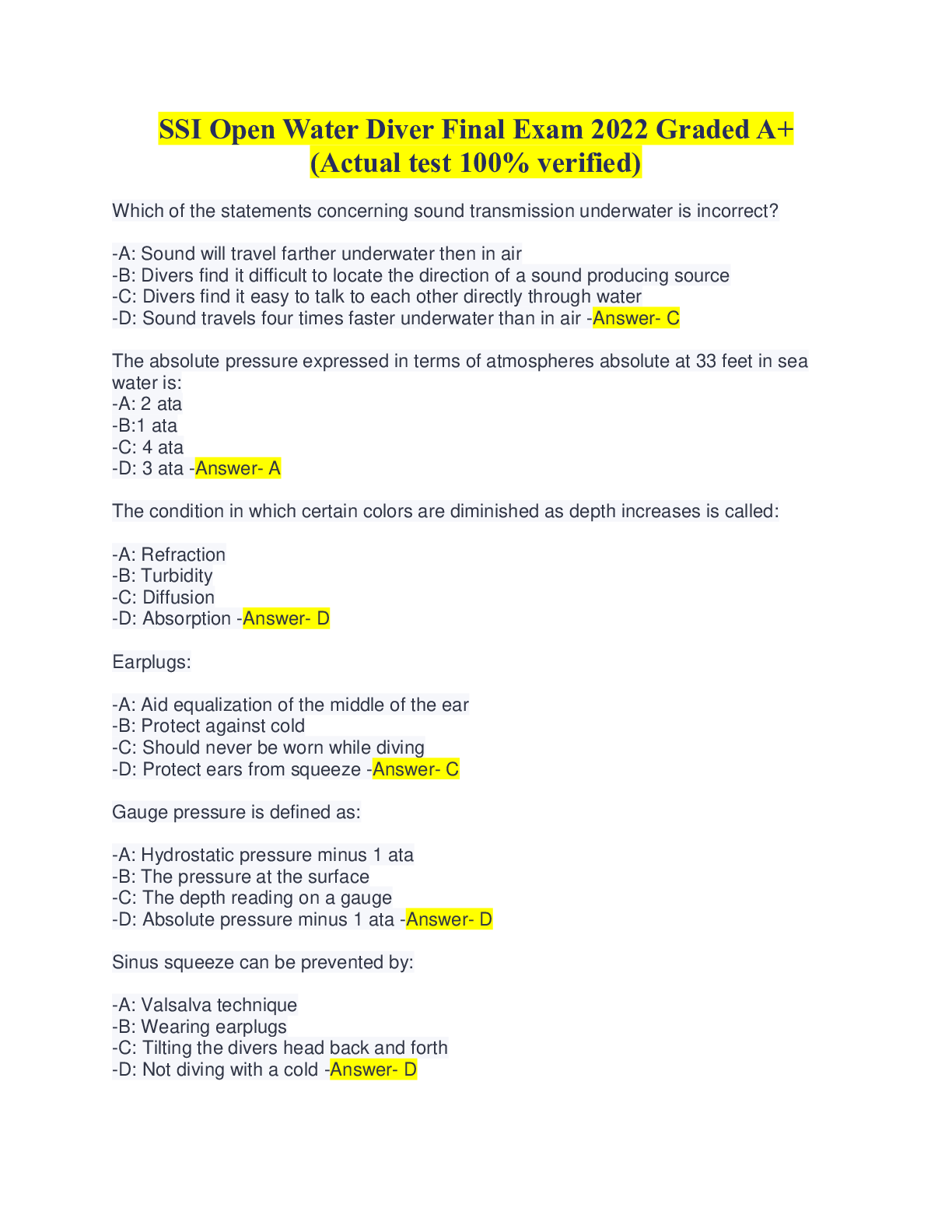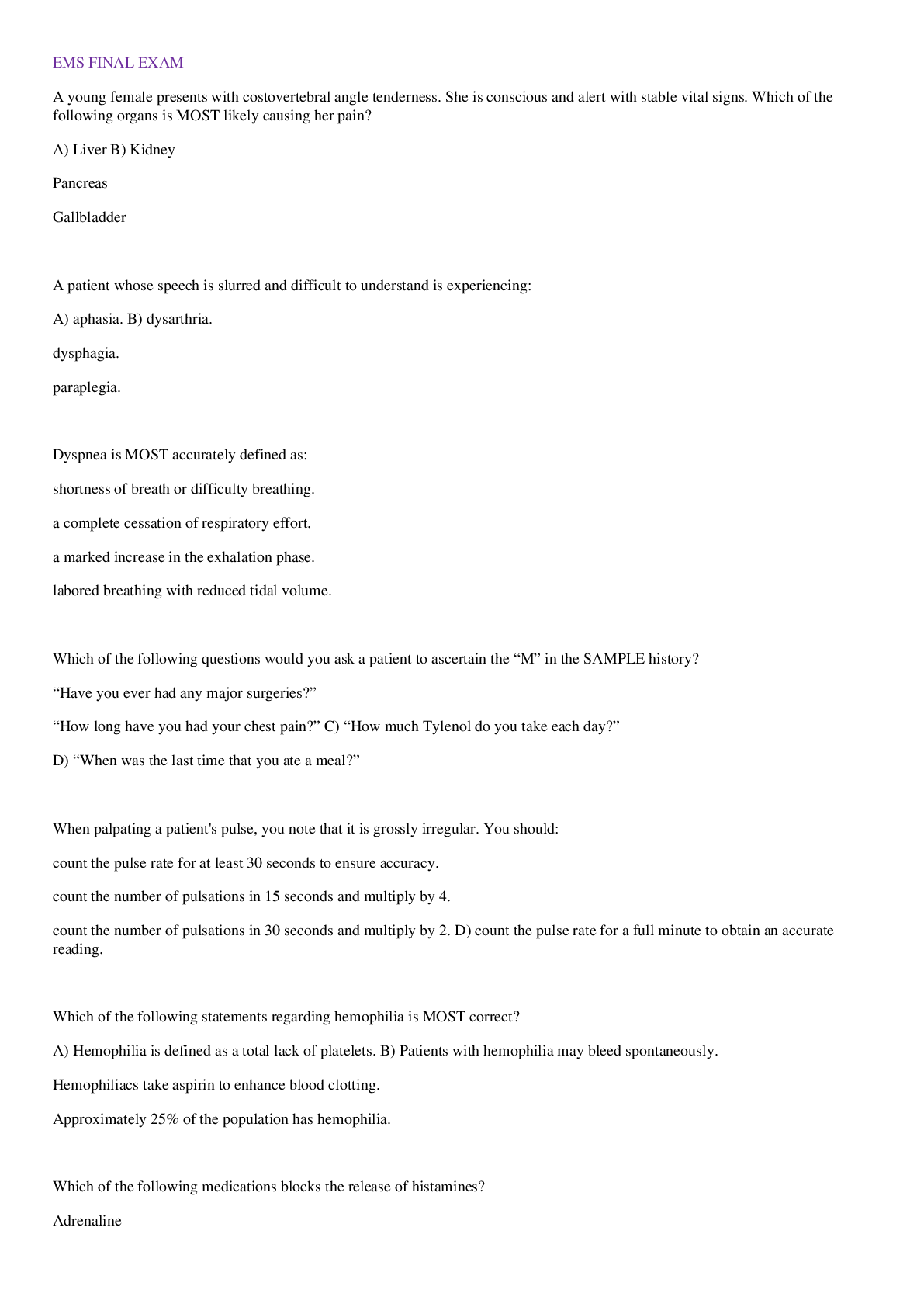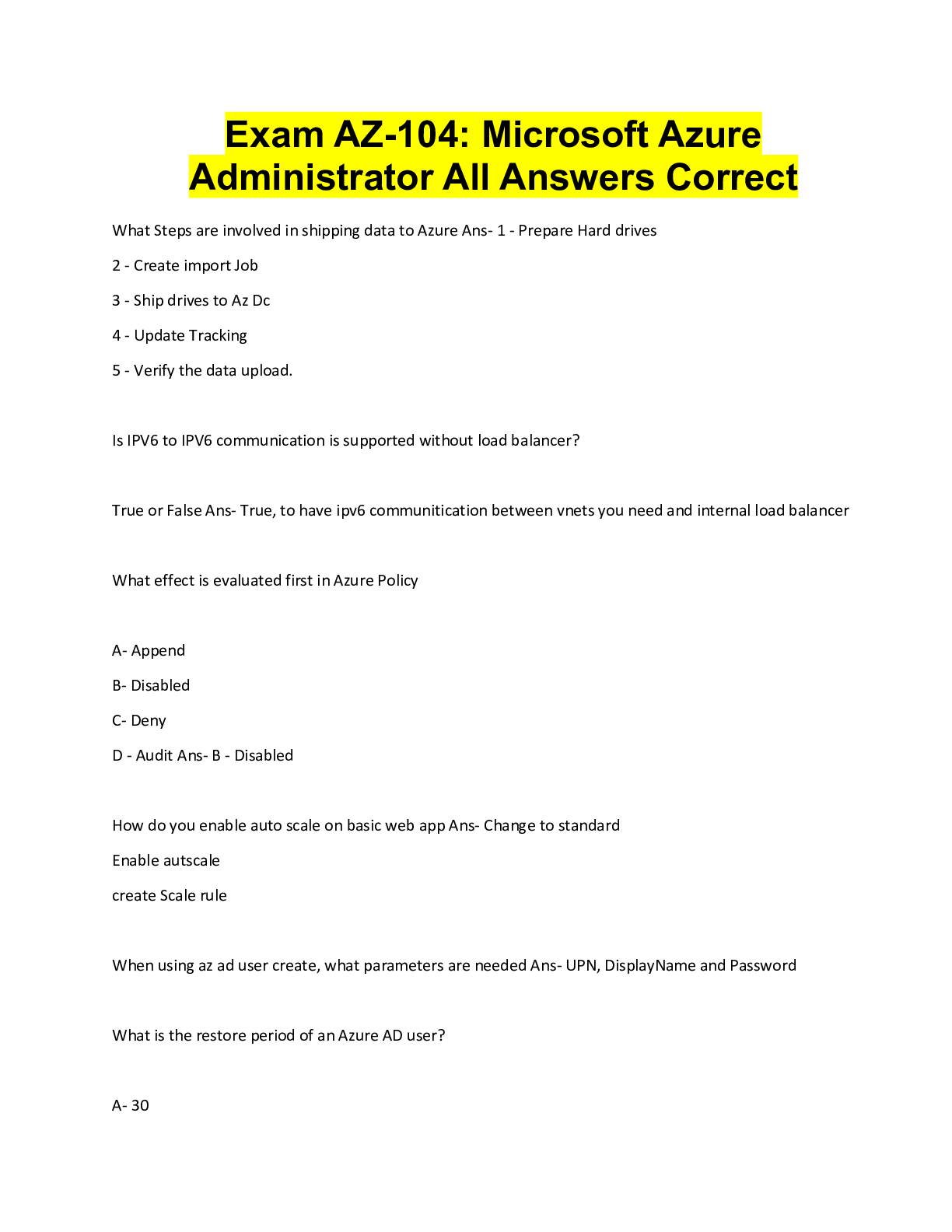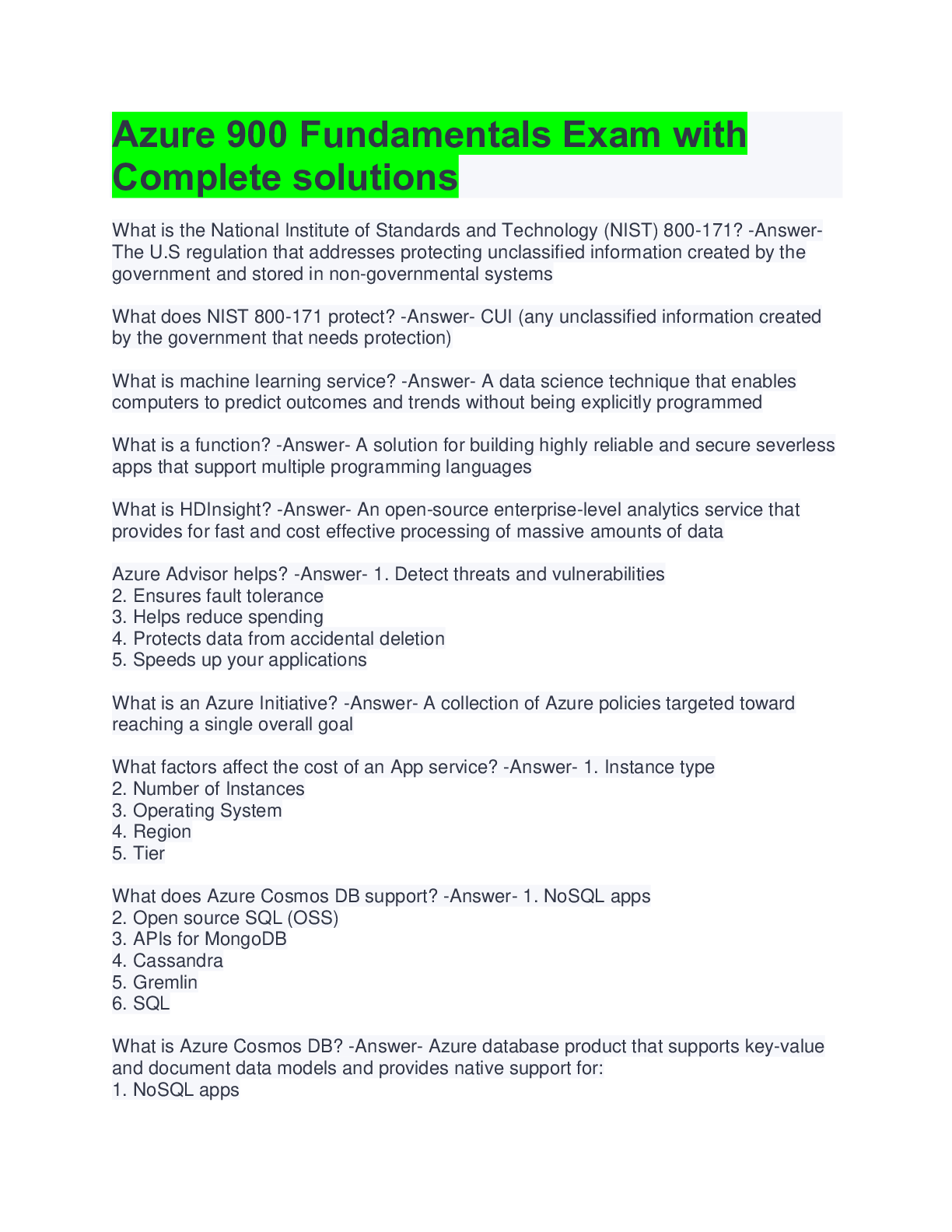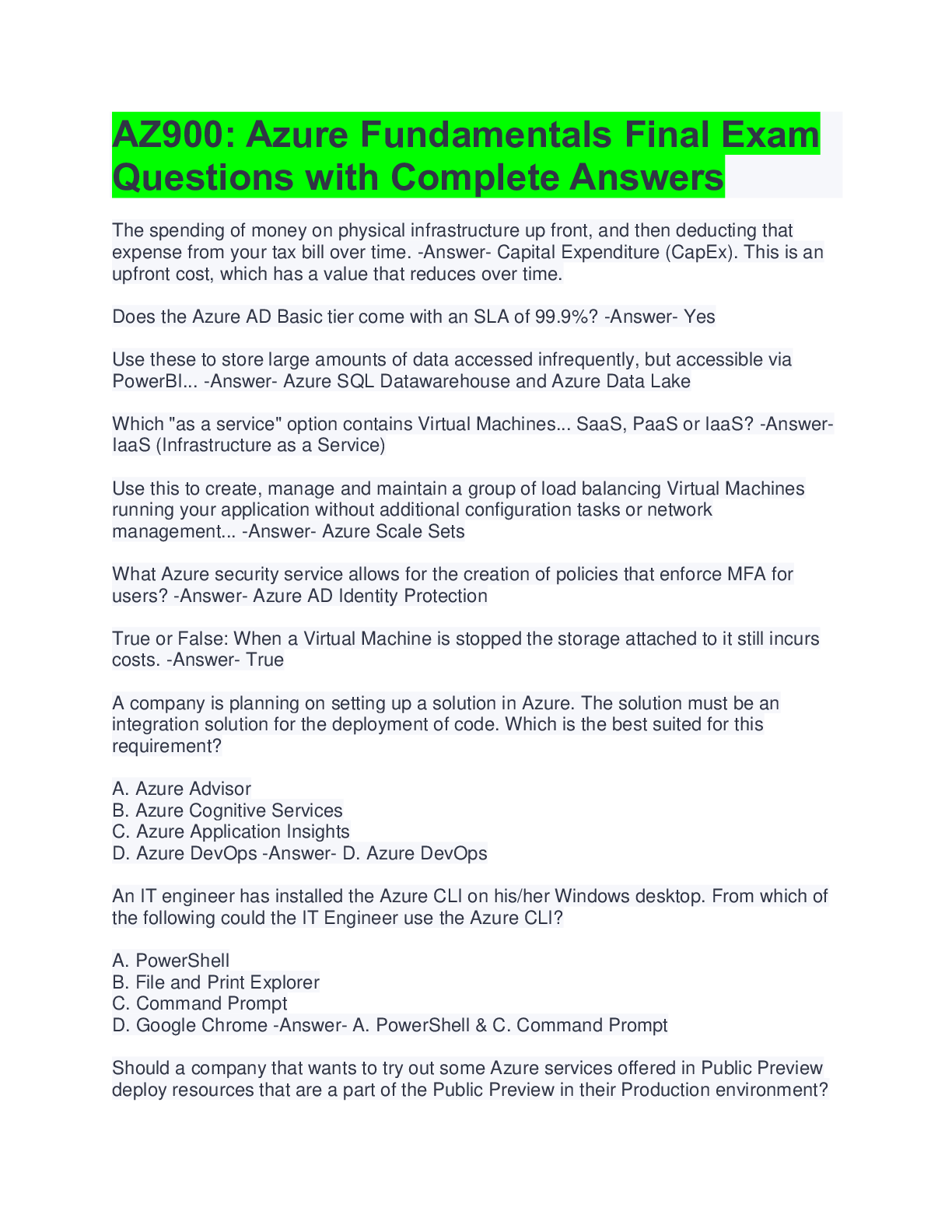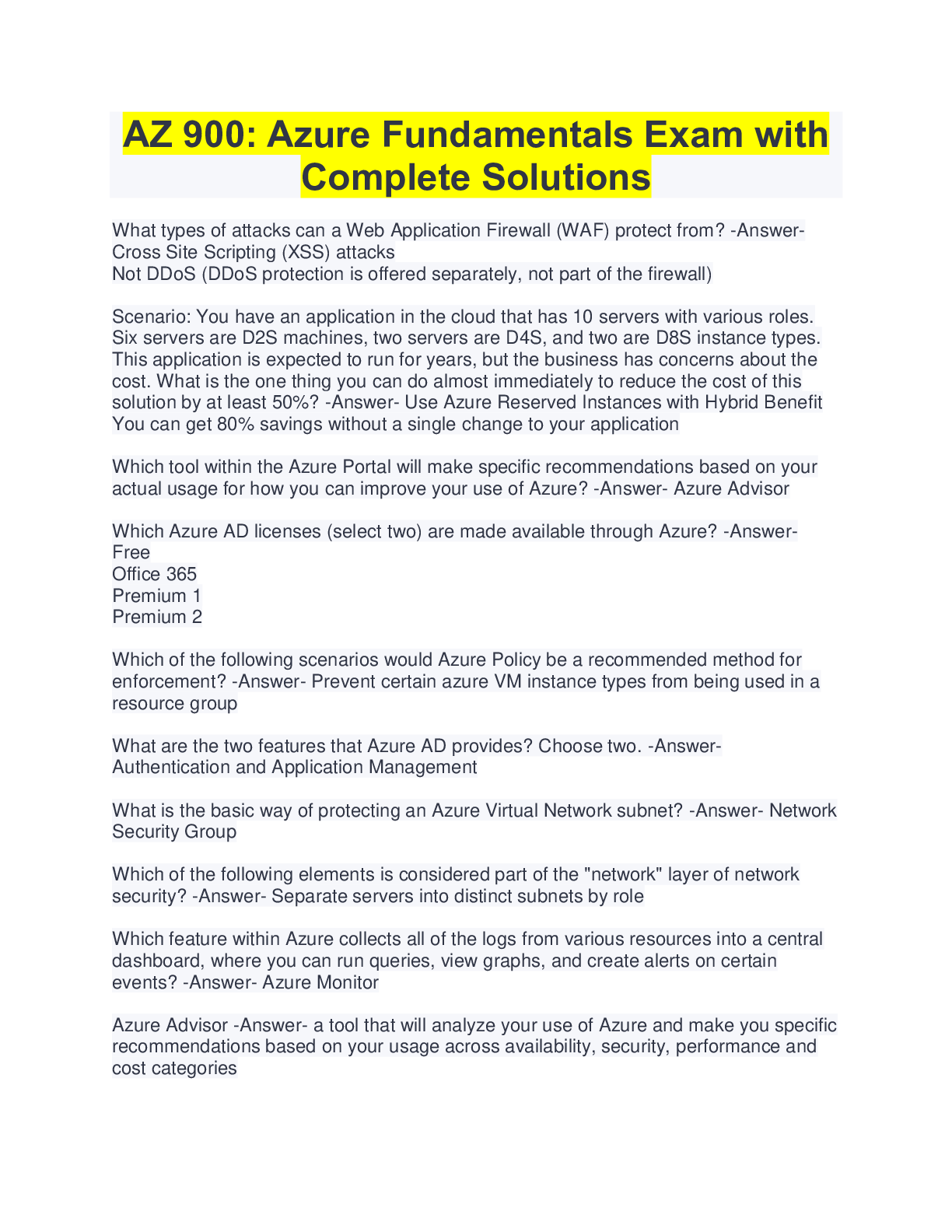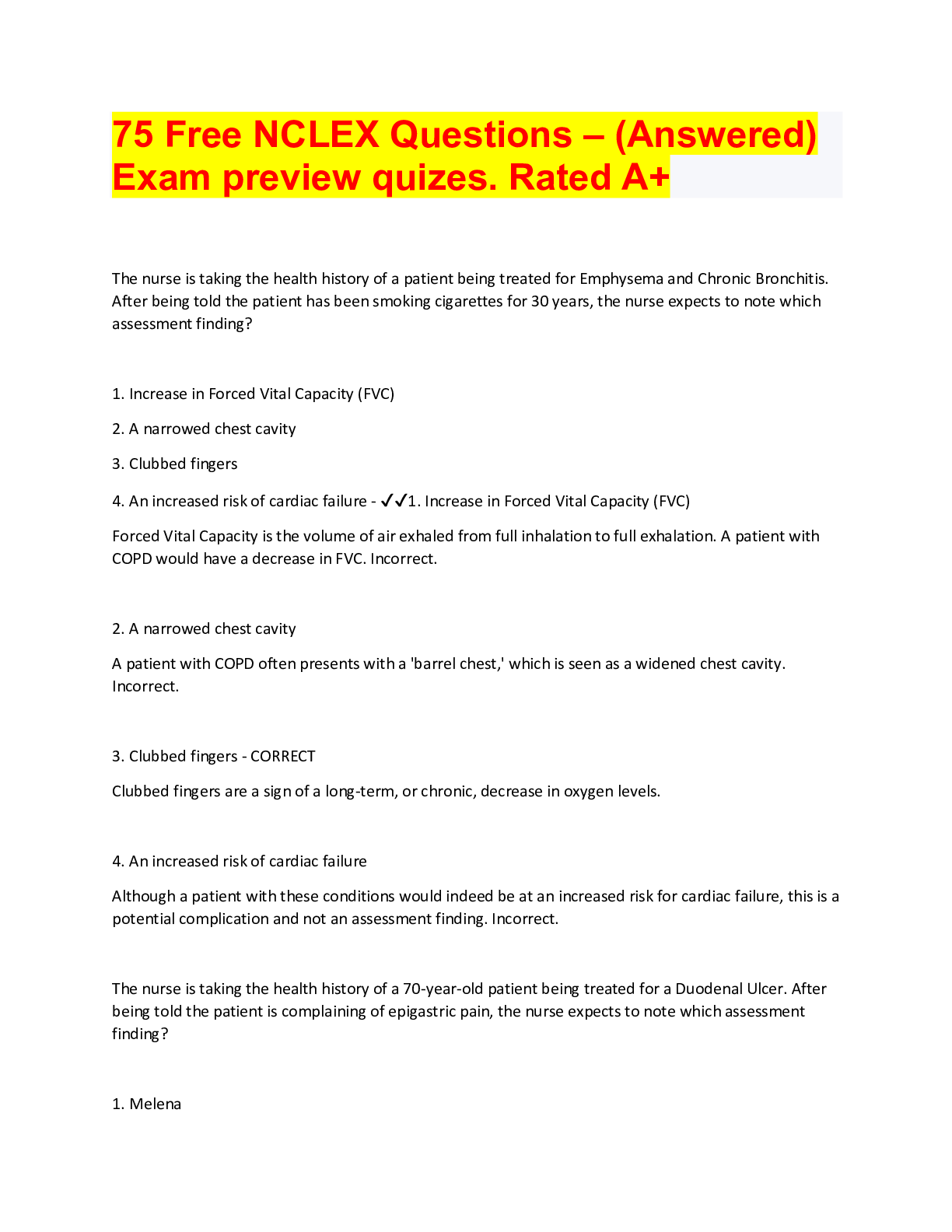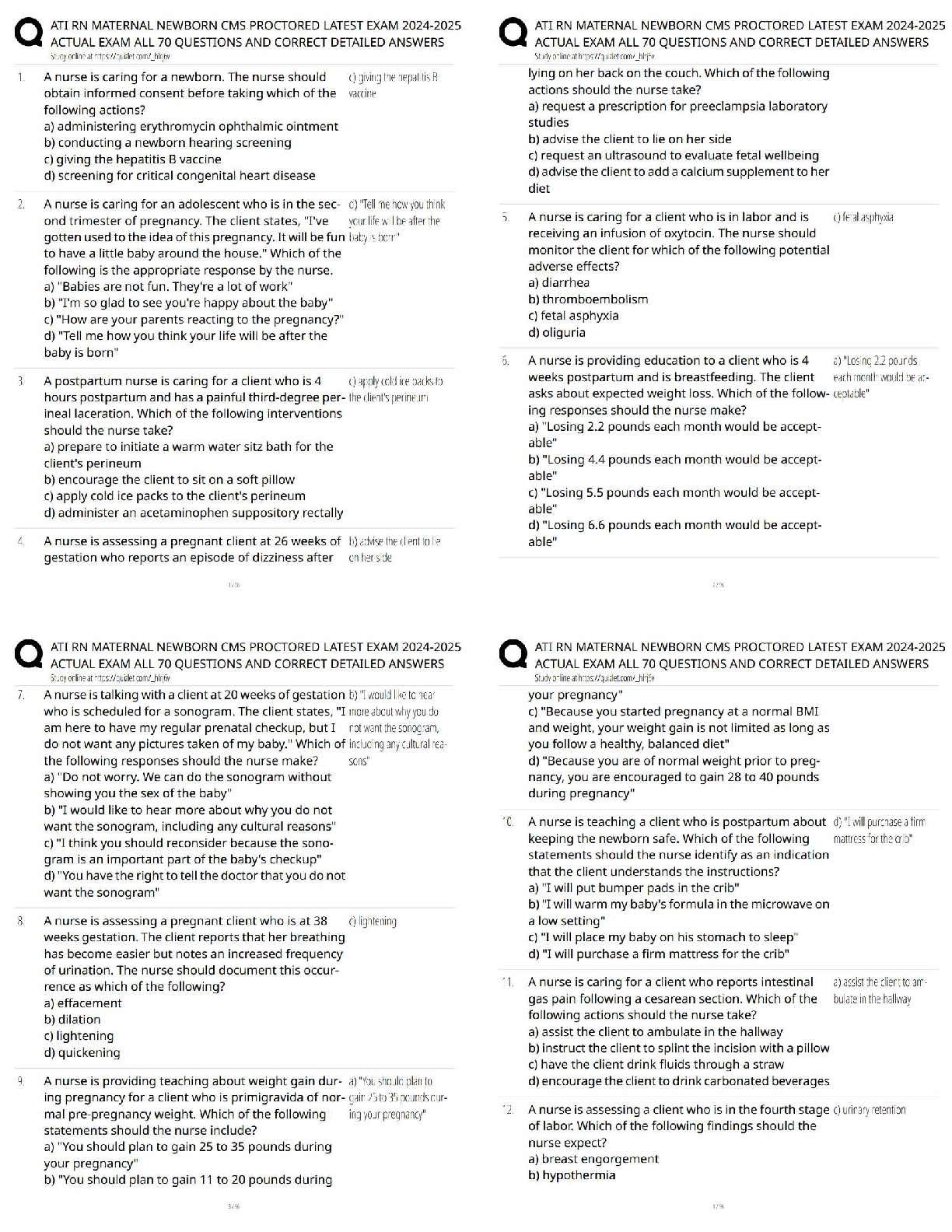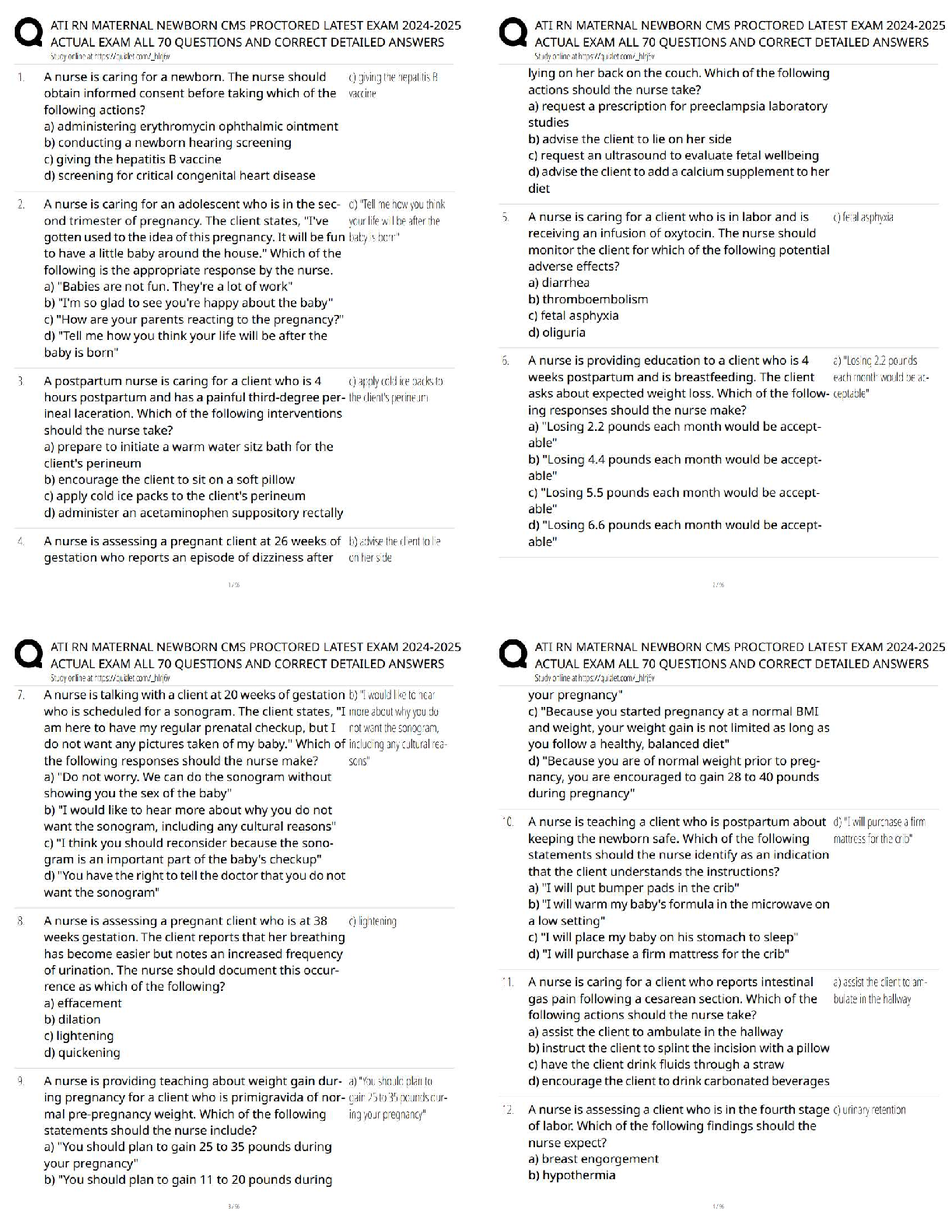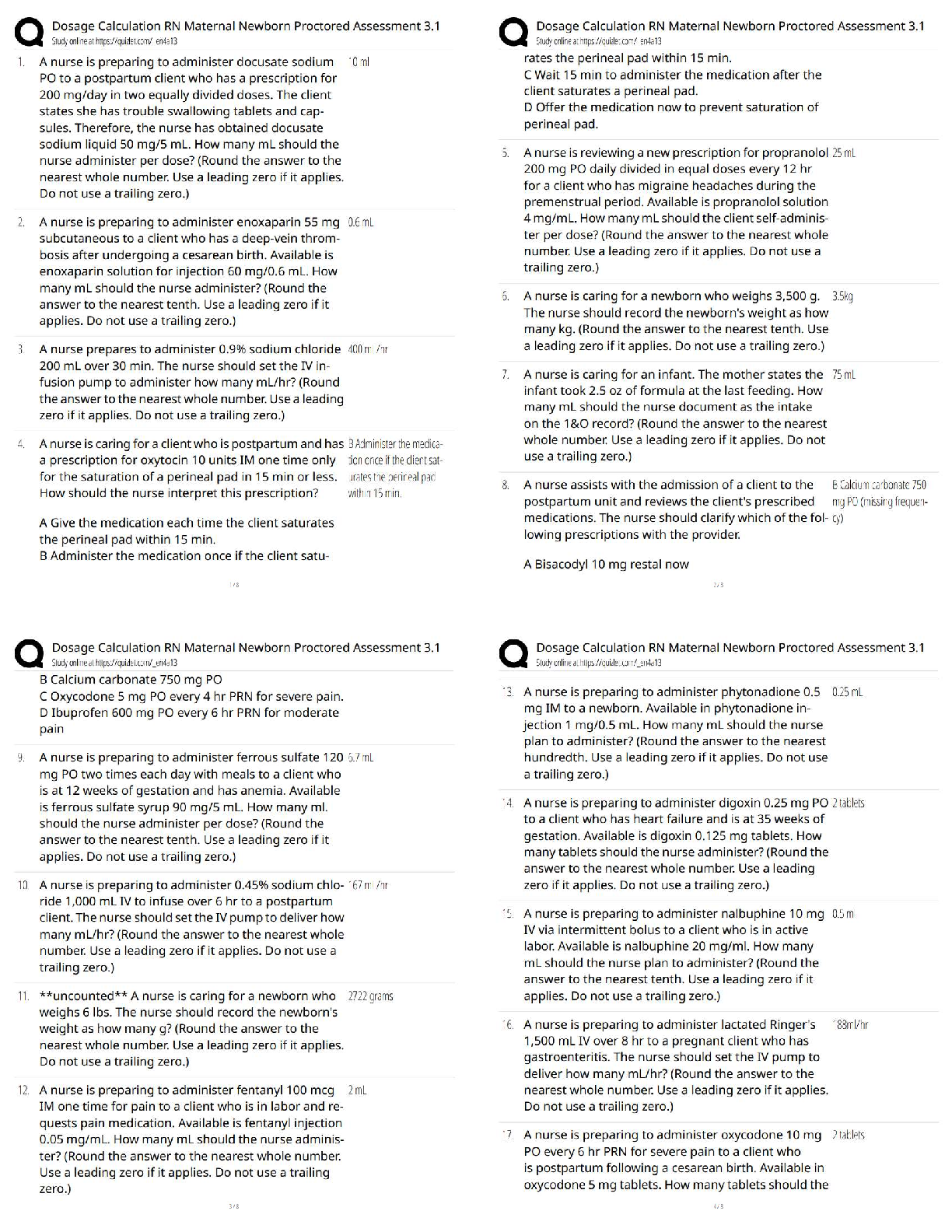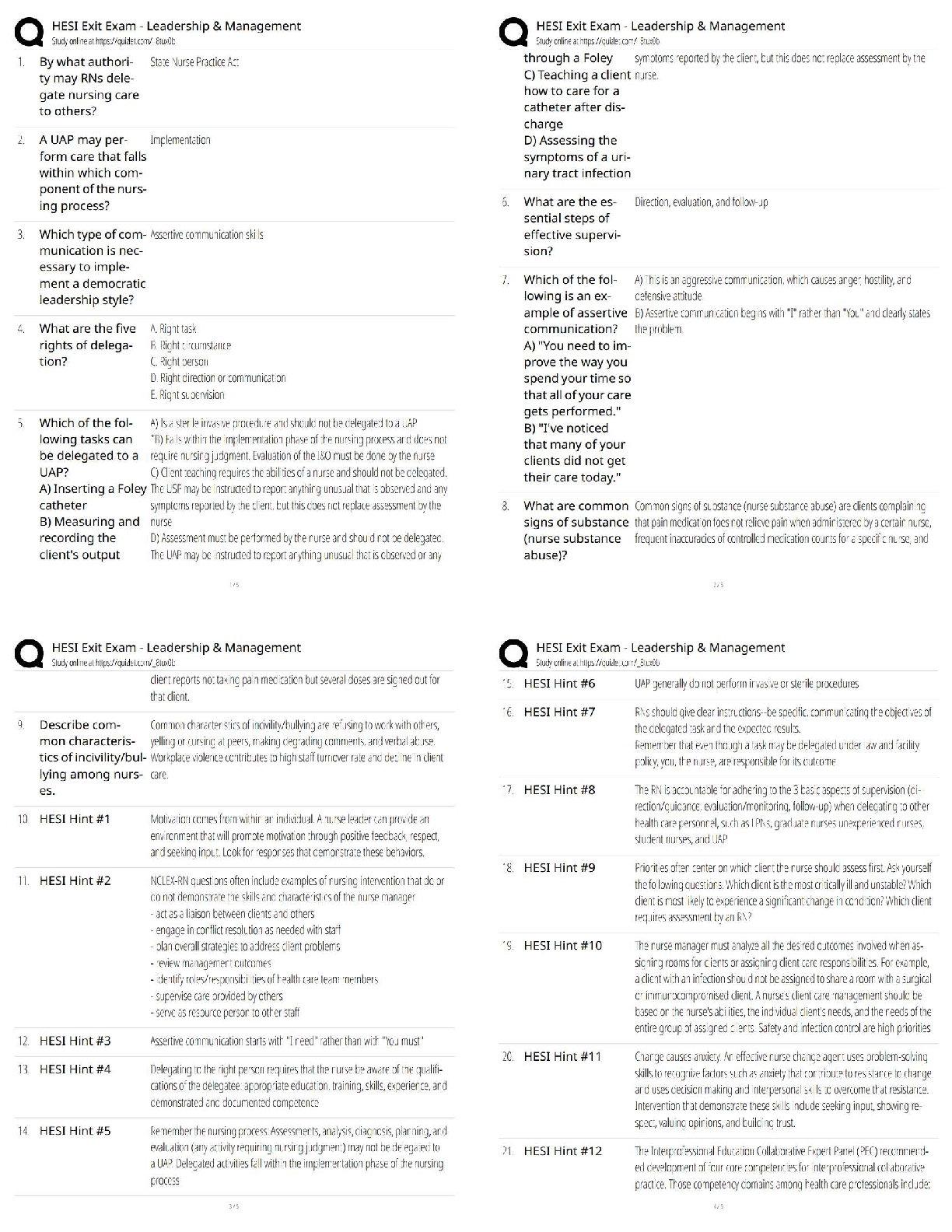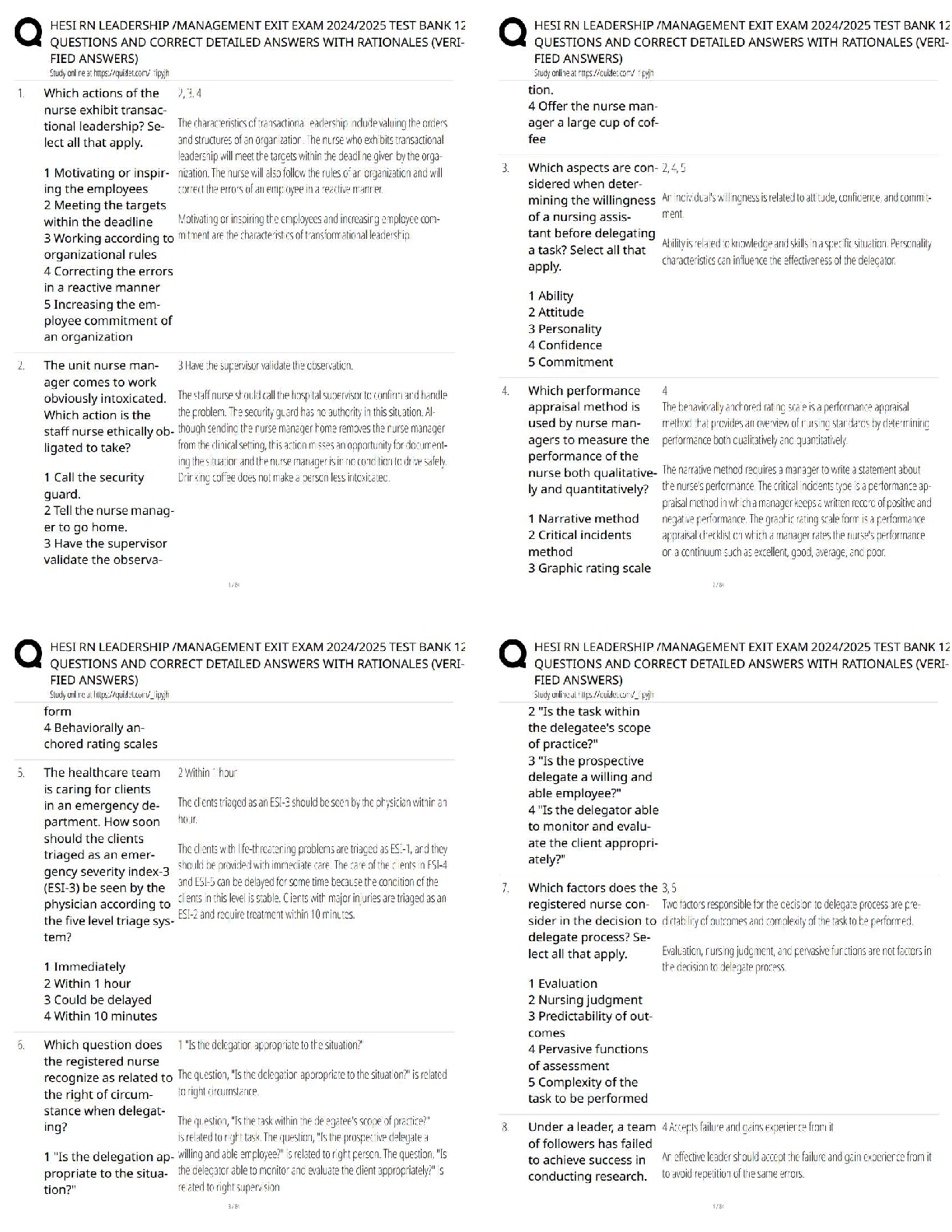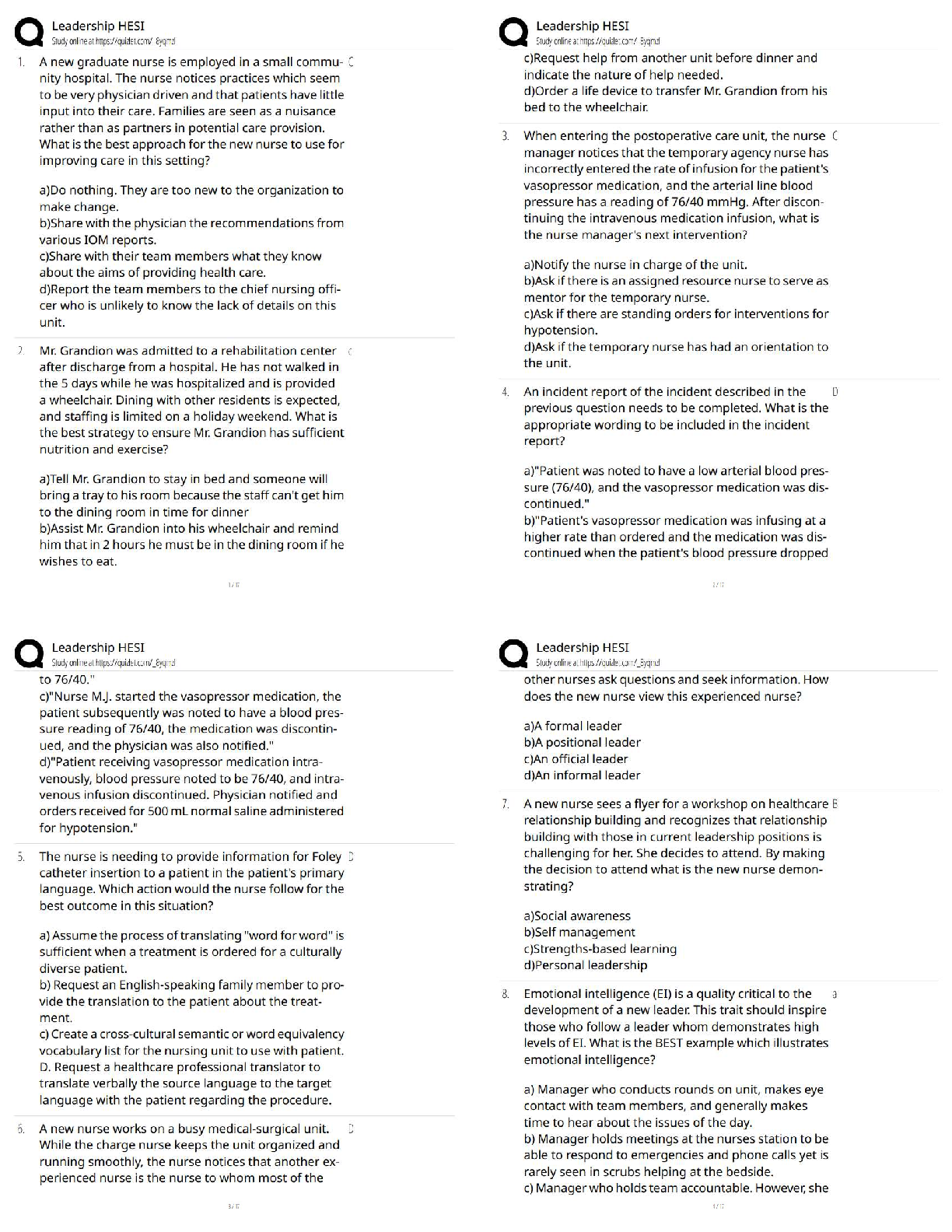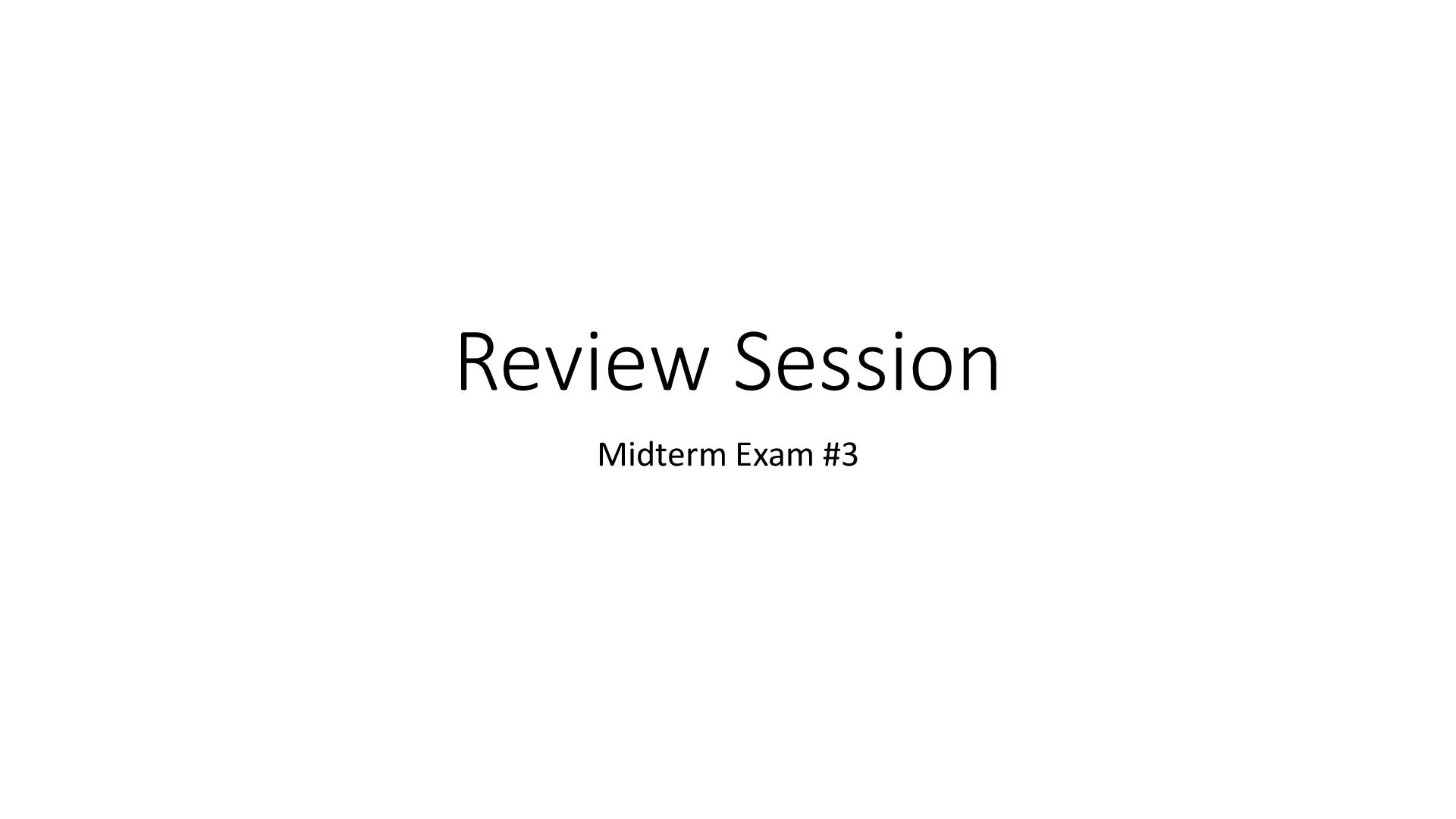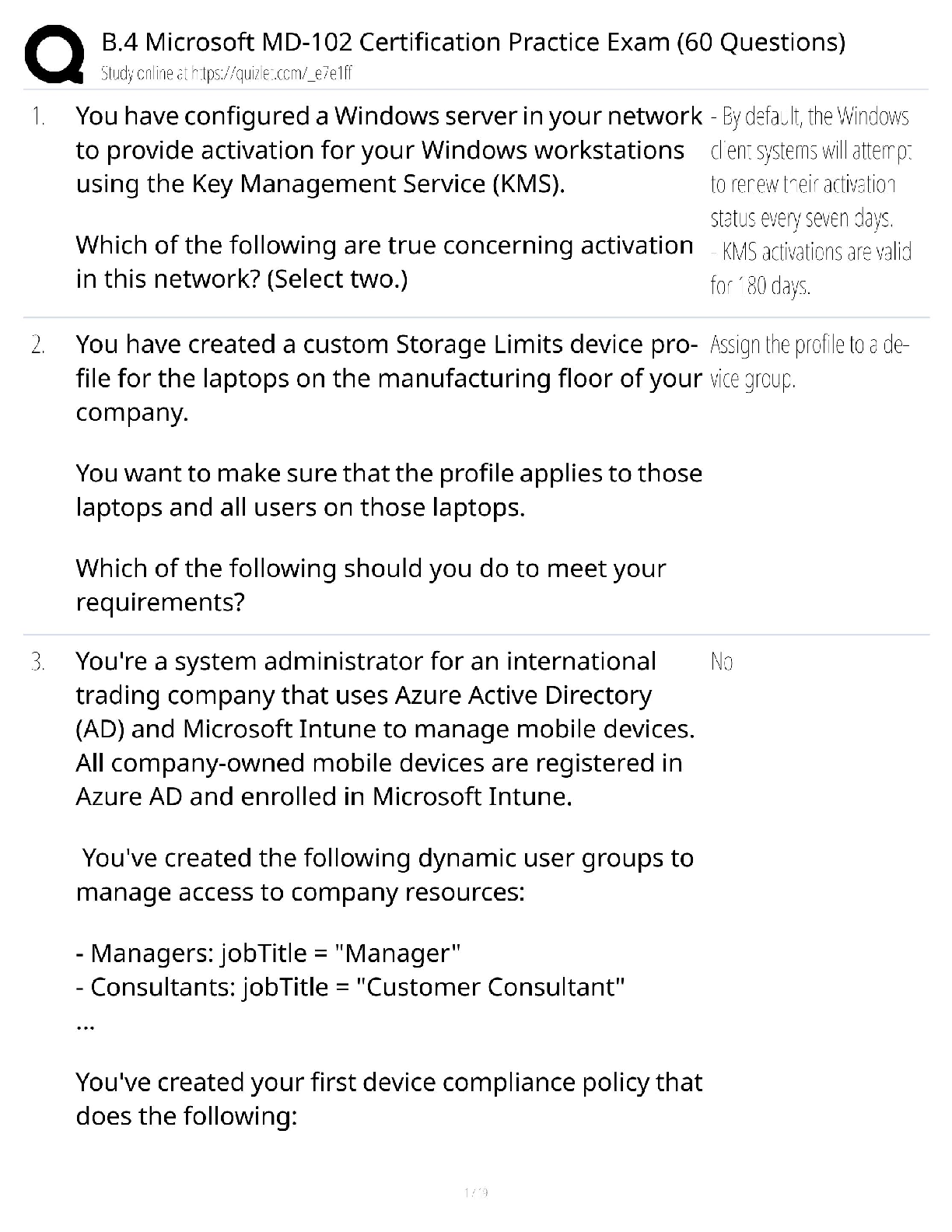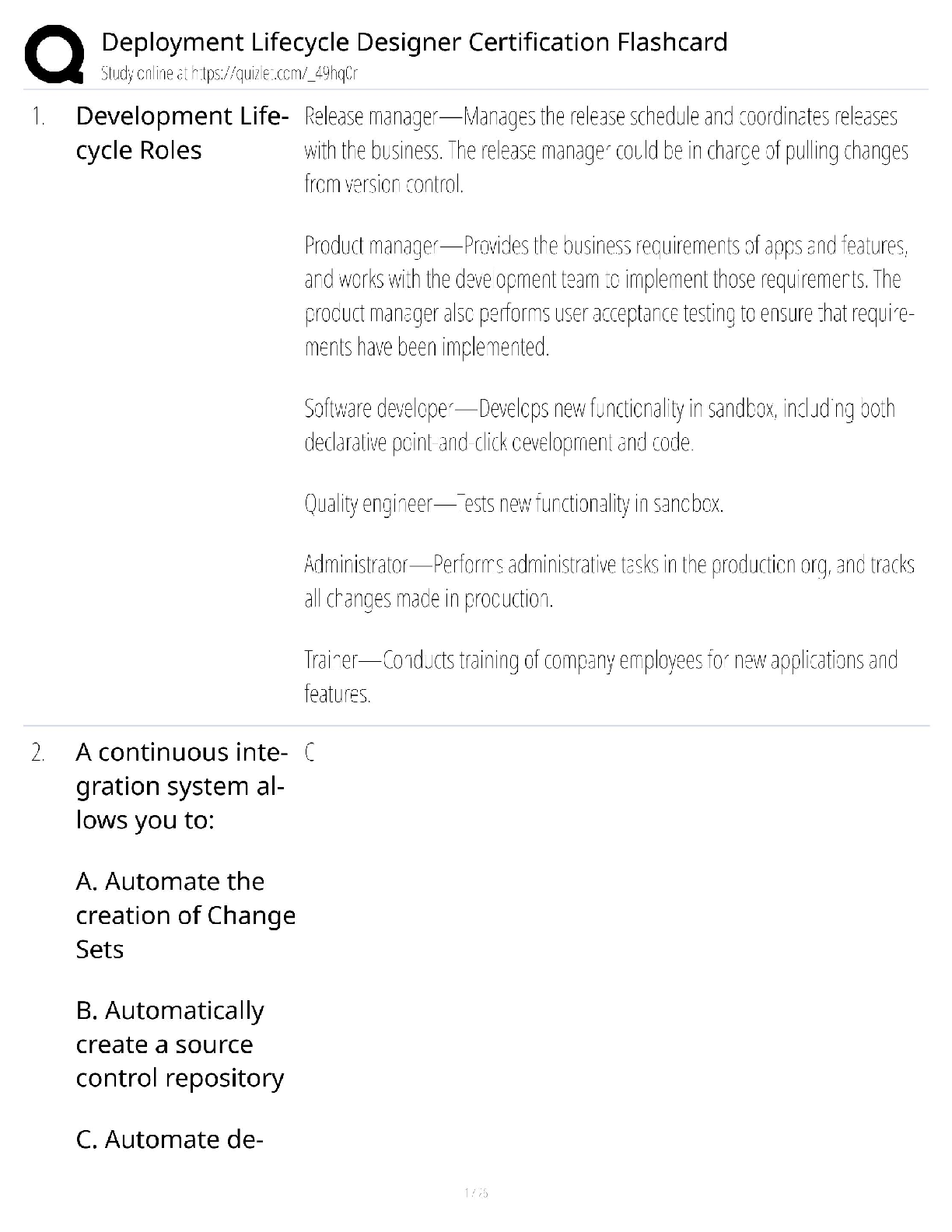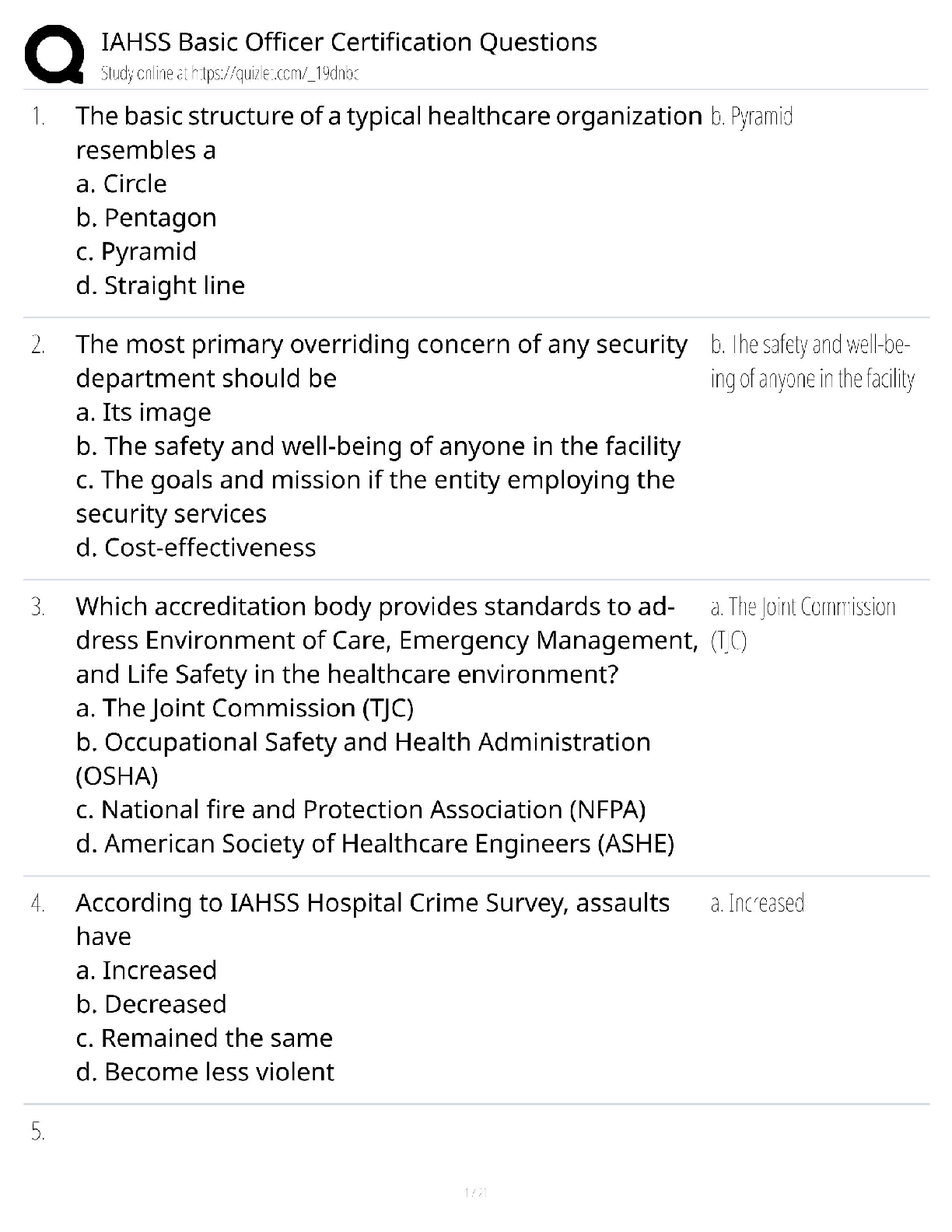Engineering > QUESTIONS & ANSWERS > Contracting Officer Warrant Board Questions and Answers 2022/Possible Questions and Answers (All)
Contracting Officer Warrant Board Questions and Answers 2022/Possible Questions and Answers
Document Content and Description Below
Contracting Officer Warrant Board Questions and Answers 2022/Possible Questions and Answers You are the PCO for a major competitive negotiated source selection. The RFP, which reflects the user's r ... equirements and is based on the user's budget, has a requirement for 220 cargo loaders to be delivered at 55 per year over the next four years. One offeror proposes to deliver all 220 loaders in the first year at a dramatically reduced price. Can you accept the offeror's proposal? What factors should you consider in your decision? -Answer- You can accept the offeror's proposal under certain circumstances. Firstly, what did the RFP say about alternate proposals? Is this a situation where requirements are changed and the other offerors should be allowed to propose on the basis of the changed requirements? You need to ask the user if he wants all 220 in the first year and are the operating locations physically able to accommodate their loaders in the first year. Finally, the offeror could be taken into discussions and asked to conform to the RFP with there being the possibility of not being selected for award or elimination from the competitive range if the proposal is not made compliant with the RFP. You are the PCO on a new $2B aircraft development program. The program is in contract negotiations for a Fixed Price Incentive (Firm Target) System Development and Demonstration contract award to a sole source contractor. The program director, a fast-burning young colonel, e-mails you that she is very concerned with the aircraft's ultimate speed at the full specification payload. She would like the contractor to achieve the faster, desired objective speed rather than the mandatory threshold speed, and thinks that an objective performance incentive would be the way to go to achieve her goal. You are asked to go to her office and discuss the matter and the issues involved in using such an incentive. What do you tell the colonel? -Answer- There are a number of considerations for the colonel: The desired additional speed should provide benefit to the Government in order to justify the expenditure of funds to achieve it. The colonel should be able to articulate the justification. The situation is very amenable to a classic performance incentive that would allow the contractor to earn profit for achieving the desired speed above and beyond what the final FPIF profit would be for achieving threshold speed. If the contractor perceives this can't happen, he will either not sign up to the incentive or will ignore it from Day One. The incentive and resulting payment have to be structured so as to be based on observable, measurable results that would determine how much is earned by the contractor. Subjectivity is not allowable under current AF policy without HCA approval. We have to be very careful to understand what possible unintended consequences could be caused by the existence of this feature in the contract. For example, will the contractor reduce aircraft weight beyond safe limits in order to help achieve the payment? Also, will the contractor consume excessive schedule to get the extra speed? There has to be a cost incentive in place so that the contractor doesn't spend an unconstrained amount of money to win the payment, such as under a CPFF contract. The FPIF share line serves this purpose when balanced against the incentive. The incentive has to be balanced with the FPIF share line so that the contractor doesn't spend more money to achieve the desired speed than he has potential to earn by receiving the payment. Similarly, the contractor can't be allowed to spend an excessive amount of money with little cost penalty to achieve success. In some cases, Contracting Officers are also Grants Officers. They can award Grants and Assistance Instruments as well as contracts. What is Assistance? How does it differ from Acquisition? What gives the Grants Officers their authority to enter into assistance? What are the types of Assistance? -Answer- When the principal purpose is to transfer a thing of value, to carry out a public purpose of support or stimulation authorized by law of the United States, it is Assistance. Acquisition, by contrast, has the principal purpose of acquiring property or services for the direct benefit or use of the United States Government. Federal agencies must be authorized by statute to support or stimulate a public purpose. The statutory authority from Congress must exist either in broad legislation or in a program-specific statute. Absent that statutory authority, a Grants Officer may not use an assistance instrument. Authorities to issue Assistance can be of three types: (1) Provide to the Secretary of Defense by statute, e.g., 10 U.S.C. 2391; (2) Authority provided to DoD components that requires no delegation by the Secretary of Defense, e.g., 10 U.S.C. 2358; (3) Authority coming indirectly from statutes, i.e., federal statute authorizing a program that is consistent with using a grant or cooperative agreement. Two types of Assistance are Grants and Cooperative Agreements. They differ in the following way: In a Grant, substantial involvement is not expected between the agency and the recipient. In Cooperative Agreement, substantial involvement is expected between the agency and the recipient. Cooperative Agreements, then, are particularly useful in the research arena when the Government is interested in being involved in program decisions or may be doing some testing or research themselves. You are the Contracting Officer on a new Research and Development program. Proposals were recently received in response to a Broad Agency Announcement, and a Cost Plus Fixed Fee contract type is anticipated. The proposal most favored by the technical team was priced significantly under what was estimated for the effort. The contractor proposed fee in an amount that equates to 20% of the estimated cost. The users have more than enough funds to cover the proposal and want you to accept the price as is. How should you advise the user and what factors should you consider in determining a reasonable fee? -Answer- The statutory limitation on fee for CPFF type contracts do no permit exceeding 15% of estimated cost for experimental, developmental, or research performed under a CPFF contract. Since the proposed amount of fee is outside the statutory limitations you need to determine what a fair and reasonable rate is that falls within the limitations. The FAR recommends a structured approach for determining fee such as Weighted Guidelines. If a cost reasonableness review determines the estimated costs to be acceptable, we can still negotiate and adjust the fee. You are the Contracting Officer for a well established transport aircraft program. The program is nearing the end of production. A Program Manager approaches you requesting that you issue a Broad Area Announcement (BAA) to support the development of a source list to supply active noise reducing headsets. The headsets are commercially available from multiple sources and the PM wants to receive performance specification sheets from each offeror and then request sample headsets be submitted for testing. The end result of the effort will be the development of a source list that can be used by various government entities to individually procure the needed headsets for their specific requirements. The PM tells you that he will not be procuring any of the headsets as a result of the BAA. What do you advise the PM? -Answer- You should advise the PM that BAAs are a method of solicitation and can only be used if the Government intends to award a contract. You might suggest that the development of the source list could be achieved by issuing a Sources Sought Synopsis with the synopsis specifying the 2 step process (spec sheets first and then sample headsets from selected offerors), and the ultimate intent of the process, e.g., a source list for use by individual users in future procurements. You might also advise the PM that there could be liability issues associated with the use, handling, and return of the headsets to the offerors and that it might be appropriate for the Government to cover shipping and any damage/wear to the units for the testing. A. Under what circumstances is ratification of an unauthorized commitment permitted? B. In general, what are the generic procedures for handling ratification actions? C. Who are the approval authorities for ratifications? -Answer- A. If the contract award would have been proper if executed by a warranted PCO, the price can be determined to be fair and reasonable, and there must have been enough of the proper type of funding available to pay for the item both at the time of the commitment and at the time of the ratification. B. An investigation is required to be completed within 30 days of discovery of the unauthorized commitment explaining how and why it occurred, how future occurrences will be avoided, and describing any corrective actions taken against responsible individuals. Legal review is also required. C. The ratification approving official for all unauthorized commitments valued at or above $1M is the SPE. The ratification approving official for all Non-DISA unauthorized commitments (regardless of amount) and DISA unauthorized commitments valued below $1M is the HCA. (DARS 1.602-3(b)(2)) You are the Contracting Officer for a much-delayed effort. On Friday you finally receive the necessary authority to release the contract for signature. It's late on Friday afternoon when you e-mail the modification to the contractor for signature. The only person at the contractor's office on Friday afternoon is the Company President's 17 year old daughter who is working there as a summer-hire secretary. She knows her father urgently wants the contract modification so she signs the document and returns it to your office. You note the last name is the same as the President's so assume that he's the one who signed the modification. Is this a legal agreement? -Answer- Probably not. The elements of a contract are - offer, acceptance, consideration, for a lawful purpose, certainty of terms, and legal capacity. It is unlikely that a 17 year old summer hire would have the authority to bind the company, regardless of her relationship to the Company President. Courts may generally find that individuals lack "the age majority" if they are under 18 years of age. The law in a given jurisdiction may never actually use the term "age of majority" and the term thereby refers to a collection of laws bestowing the status of adulthood. The age of majority is a legally fixed age, concept, or statutory principle, which may differ depending on the jurisdiction, and may not necessarily correspond to actual mental or physical maturity of an individual. In practical terms, there are certain specific actions which a person who attains the age of majority is permitted to take, which they could not do before. These may include entering into a binding contract, buying stocks, voting, buying and/or consuming alcoholic beverages, driving motor vehicles on public roads, and marrying without obtaining consent of others. The ages at which these various rights or powers may be exercised vary as between the various rights and as between different jurisdictions. For example, the ages at which a person may obtain a license to drive a car or consume alcoholic beverages vary considerably between and also within jurisdictions. You are the Contracting Officer for a follow-on buy source selection. The current effort has had the same Program Manager for over 10 years. She began as the PM while still a Military Officer and then retired and was re-hired as an A&AS employee to continue to manage the program. She has extensive experience on the program and is considered a Primary "Go To" person for all Program-related managerial issues. The Program Director wants to utilize the PM's experience to the fullest extent possible and has proposed that the PM be listed as chief of the technical evaluation team and also a voting member of the source selection board. Is it permissible to have a non-Government employee (A&AS contractor) as chief of the technical evaluation team and a voting member of the source selection board? -Answer- It is not permissible to have a non-Government employee as a voting member of any source selection board. FAR 7.503(c)(12)(ii). FAR policy states that contracts shall not be used for the performance of inherently governmental functions. OMB may review Agency decisions to determine whether a function is or is not an inherently governmental function, but a list of examples is in FAR 7.503(c). They include: control of criminal investigations or prosecutions, command of military forces, determination of agency policy and application of regulations, determining budget priorities, and direction and control of federal employees. Specifically, included in this list are determining what supplies or services shall be acquired by the Government on a prime contract and being a voting member of any source selection boards You have a contract for engineering services with a basic period of performance and several one year options for continued performance. The contract states that all options must be exercised by 1 October of each year. The basic period of performance has just expired and on 5 October you realize that you never exercised the option for continued performance. There is still an immediate need for the services. How would you try to rectify this situation? -Answer- Once the option has expired there is no contract. You may have to prepare a J&A (depending on your original authorizations) and enter into a bilateral agreement with the contractor to obtain continued performance by the same contractor. The contractor is entitled to renegotiate the price. The end of the fiscal year 10 is coming up and you get a phone call from HQ telling you that several million dollars just became available - they don't want the money to go to waste and want to give it to you to support your requirements. Your Program Director urges you to use the money to buy spare parts for his aircraft which have been operating 24/7 since "the war" began. The Program Director has estimated the funds will by enough replenishment spares for the remainder of the war. Do you have any concerns? -Answer- You have two major concerns. First, you have to ask HQ the color of money and year of the funds they want to send you. Do not assume that they are sending you FY10 O&M funds. If they are sending you FY10 O&M funds you can use the funds for "operations and maintenance' but you will have to obligate the money before the end of the fiscal year closes out. Once you have determined the kind and year of money, you can address the Program Director's request. Since the Program Director is asking you to buy replenishment spares, you can use the money to buy these spares assuming the Program Director can show you a bona fide need for the spares. This means you can buy sufficient spares for a current need (which includes a reasonable inventory) but you cannot stockpile. Even if the contractor cannot deliver the spares in FY10, you still have a bona fide need of FY10 if the contractor can deliver the spares in a "reasonable" time. Here the Program Director appears to want you to buy spares sufficient to satisfy his needs for the entire war, a sure indication of his intent to stockpile. You will have to go back to the program director to find out the spares he can actually put on an aircraft right now plus find out what a reasonable inventory is for his program. You cannot use current O&M funds to satisfy a "future" need since that violates the bona fide needs rule. Please define a Certificate of Current Cost or Pricing Data and its purpose. What are some of the key things you would expect to see or review before accepting the certificate? There are several exceptions to obtaining a Certificate - please list some of them. -Answer- The definition is as follows: A Certificate of Current Cost or Pricing Data certifies that to the best of the company's knowledge, the cost or pricing data submitted were accurate, complete, and current as of the date of agreement on price or, if applicable, an earlier date agreed upon between the parties that is as close as practicable to the date of agreement on price. The purpose is to have the company commit as to the accuracy, completeness, and currency of submitted data. If the data is later found to be incorrect or appropriate data was not submitted, the government reserves the right to a downward contract price adjustment for any monetary damages incurred. Key things we would expect to see or review in a Certificate are: The certificate is in the format shown in FAR 15.406-2 Current as of the date of agreement on price or an earlier agreed upon date Signed by an authorized representative of the company and dated as close as practicable to the date when price negotiations were concluded Check for qualifications or new information disclosed by the sweep and evaluate its impact on the negotiated price Exceptions: Adequate Price Competition Prices set by law or regulation Commercial Item Waiver has been granted Mod to a contract/subcontract for commercial items [Show More]
Last updated: 3 years ago
Preview 1 out of 39 pages
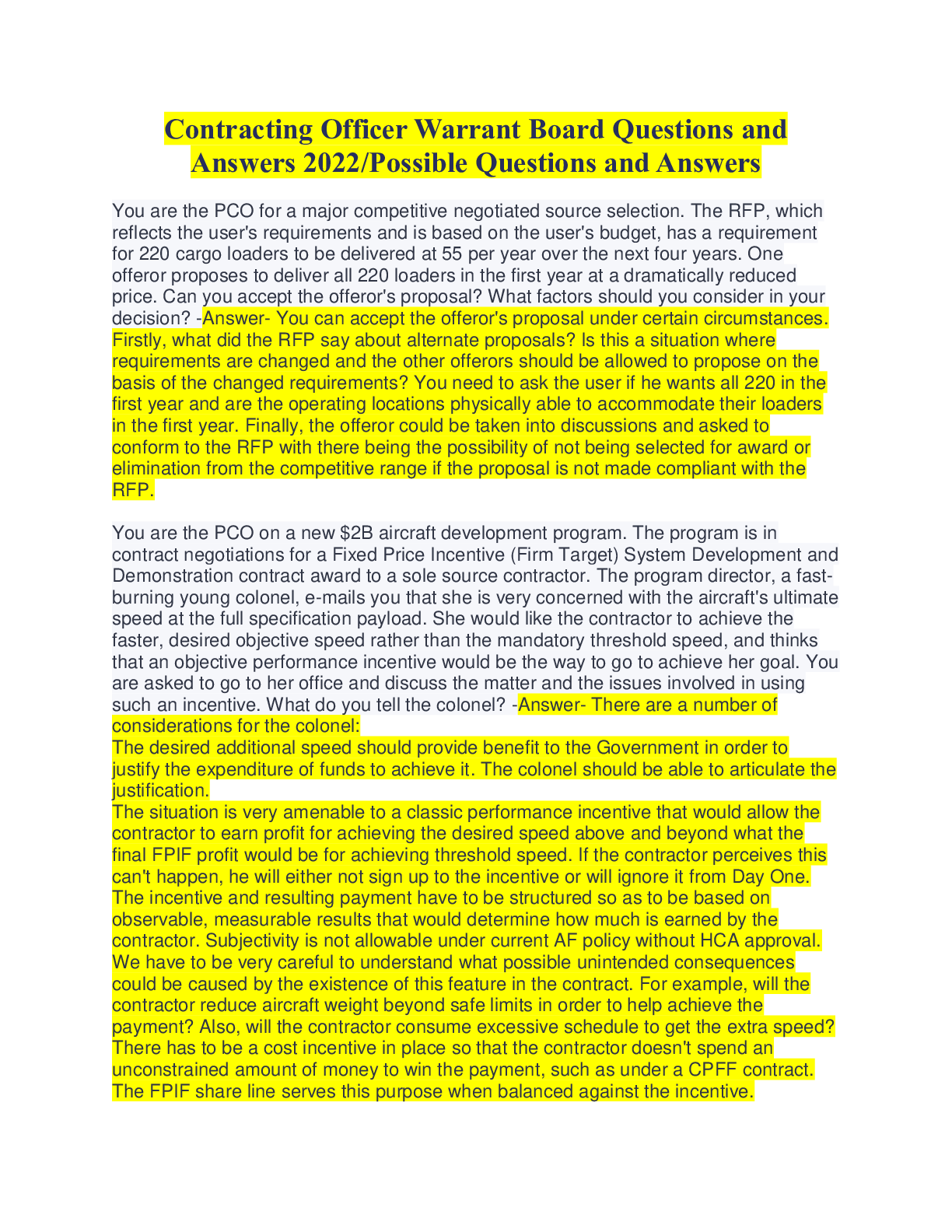
Buy this document to get the full access instantly
Instant Download Access after purchase
Buy NowInstant download
We Accept:

Reviews( 0 )
$12.00
Can't find what you want? Try our AI powered Search
Document information
Connected school, study & course
About the document
Uploaded On
Sep 14, 2022
Number of pages
39
Written in
All
Additional information
This document has been written for:
Uploaded
Sep 14, 2022
Downloads
1
Views
216

